Do Pigeons Have Feelings?
Yes, they do. This brings up other unanswered questions like, do pigeons have feelings? do they get angry or happy just like humans, etc.
Fortunately, there is scientific research to suggest that pigeons exhibit feelings of fear, affection, joy and stress. In fact, pigeons form strong emotional bonds that are revealed through displays of attachment and empathy.
And in this article, we’re going to delve deeper into the emotional spectrum of pigeons backed up by evidence of their behavioral patterns.
Want to learn more about pigeon fun fact:
Do Pigeons Experience Emotions?
Pigeons exhibit emotions but they do not mirror humans in their way of expression. Several observations of pigeons displaying signs of fear, happiness, stress and attachment offer glimpses into their emotional world.
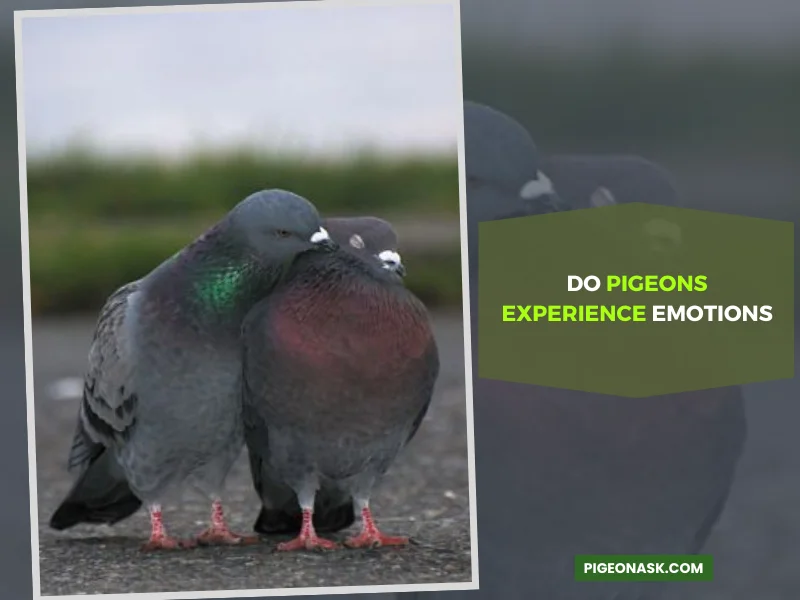
Some emotions are more evidently observed in pigeons than others. The expression of fear is particularly apparent when pigeons respond to perceived threats such as sudden movements or loud noises by fleeing or seeking cover.
Additionally, studies have demonstrated that pigeons can form strong social bonds with other pigeons and even humans. This indicates their capacity for attachment and emotional connections.
Can Pigeons Feel Depressed?
Equating pigeon behavior to human emotions like depression requires caution as they do not have the human’s telltale signs of depression.
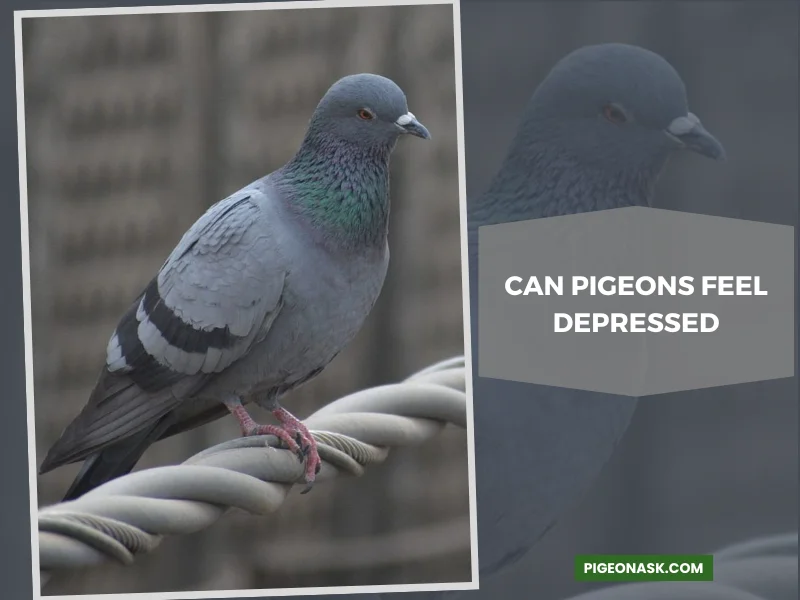
Some evidence, presented through physical and behavioral expressions, point to the possibility of pigeons experiencing emotions that resemble low moods.
Physical Appearance
From a physical standpoint, a pigeon experiencing sadness might have disheveled feathers, with a drooping head supported by a slouched stance.
Regular Behavior
In terms of behavior, the pigeon will appear sluggish, self-absorbed, grooming its feathers for long extended periods, or perch away in a secluded corner and refusing to immerse in lively activities.
Stress
Additionally, stress is a common trigger for altered behaviors in pigeons which can mimic aspects of depression.
When subjected to stressful situations, pigeons may exhibit reduced appetite, decreased social interactions, and altered movement patterns. These behavioral changes parallel some signs of depression for different contexts.
Diagnosis of Depression in Pigeons
Determining true depression in pigeons remains a challenge. Pigeons lack verbal and cognitive abilities to convey their emotions, thus making it difficult to diagnose depression.
While observed behaviors suggest a potential link between avian emotions and low moods, further research is needed to unravel the complexities of an emotional range in pigeons.
Read our article about “Pigeon Fun Facts“
Do Pigeons Feel Guilt and Shame?
Currently there is no evidence to suggest that pigeons have any capacity to feel complex human emotions such as guilt and shame.
Both of these emotions require very specific and acute cognitive faculties to be observed. Pigeons are a bit simpler, they mostly use instinctive behaviors they have learned from their environment as guidance.
Do Pigeons Get Attached to Humans?
One remarkable facet of pigeon behavior is their ability to form attachments not just within their own species but with humans at large.
Pigeons have a propensity to develop trusting relationships with humans who take care of them by providing food and care.
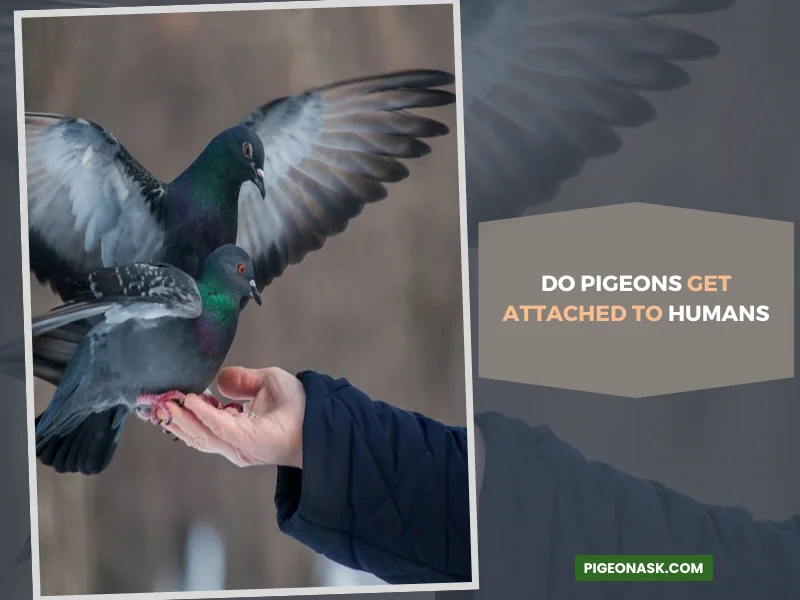
This attachment is demonstrated through their openness to approach, interact and even follow around these familiar human figures.
Research has indicated that pigeons can distinguish between different humans based on their interactions and behaviors. They appear to remember specific humans and respond differently to each based on the nature of their past interactions.
This ability to form bonds with humans highlights the complexity of pigeon emotions and their capacity for social connections that extend beyond their own kind.
Is It Possible to Traumatize a Pigeon?
Pretty much all animal can feel trauma in a stressed or threatening environment, and pigeons are no exception to that. Any form of physical or psychological stress may lead to trauma in pigeons.
Trauma can arise in nature, like when a predator attacks. Or it can also be induced in safer domestic environments, like the case for pet pigeons who are confined with company, neglected or mistreated by any human who gets access to them.
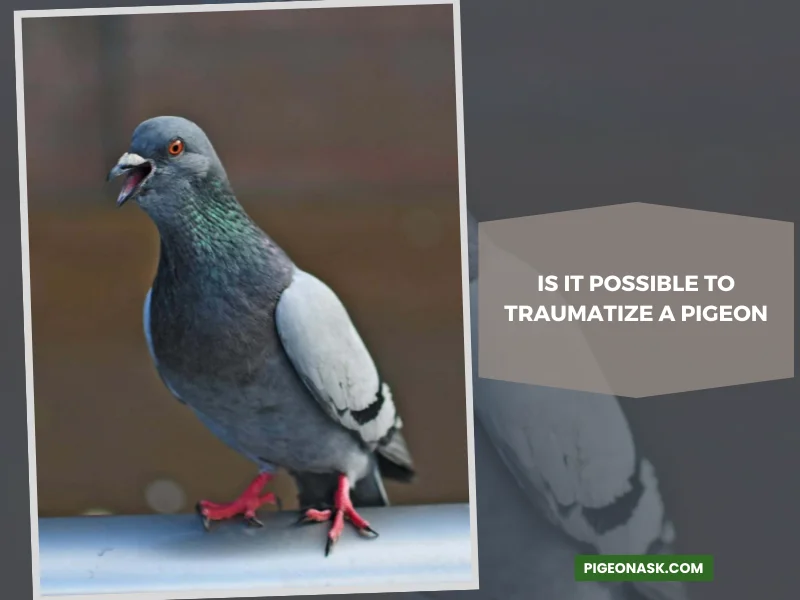
Trauma in pigeons may materialize in several ways. Most commonly, trauma can be observed through expressions of fear, detachment, irritability, aggression, and confusion.
Particularly in birds, trauma can trigger alterations in behavior and physiology, such as feather-plucking, respiratory problems, diminished appetite, aggression and even shifts in migratory behavior.
Furthermore, there is some research to show that traumatic encounters may lead to compromised cognitive function in them.
This is in fact true for most creatures in the animal kingdom and the optimal approach to rectify this trauma is to establish an environment that fosters feelings of safety, and protection.
What Do We Know About Pigeon Empathy for Other Pigeons?
Pigeons’ capacity for empathy has also been documented with studies showing that when one of their own is in distress or danger, they will coo to communicate with them and warn them about the imminent danger.
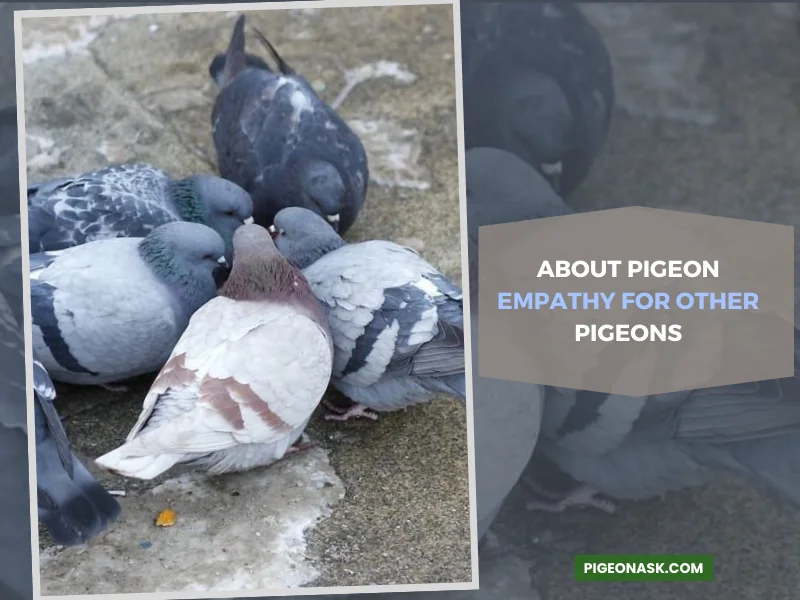
The cooing is a vocalized response that is most commonly recognized.
Pigeons can be cautious too. They use another stealthy way to warn other pigeons that humans can’t even register. This is called grunting, and it is done as an alarm of potential danger.
It’s clearly an empathetic behavior that underscores the depth of their emotional understanding and experience, thus exhibiting a sense of unity within their own species.
How Do You Know If a Pigeon Is Sad?
Identifying signs of sadness in pigeons requires a nuanced understanding of their behavior. Pigeons subjected to stressful conditions or environments may display behaviors indicative of low moods.
When experiencing sadness, pigeons may display a decrease in activity levels, altered patterns, eating irregularities, reduced social interactions and even changes in vocalization.
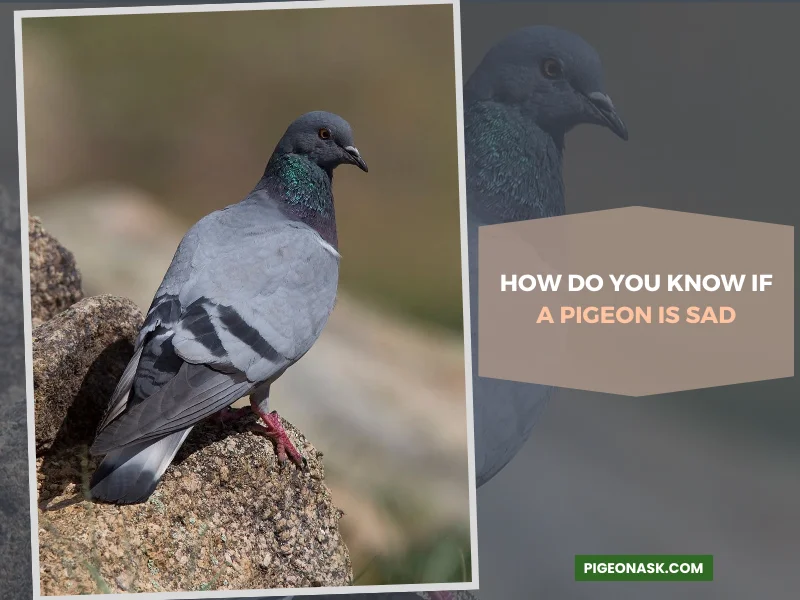
An observant eye may notice a pigeon spending more time alone, displaying lethargy or exhibiting a lack of interest in its own surroundings.
However, it is crucial to interpret pigeon behavior within the context of their species-specific characteristics and environmental factors.
So far, the most challenging feat for humans with a penchant towards pigeons is to read, observe and correctly assess the pigeons’ emotional state.
As discussed earlier, pigeons do not express emotions in the same way as humans, so their behavioral patterns will need some deciphering for the untrained human mind.
Although there are indicators that pigeons may experience emotions resembling sadness, it is important to approach this interpretation with caution and consider the broader spectrum of avian behaviors.
Key Takeaways
The emotional world of pigeons is a captivating realm that continues to unfold through scientific investigation.
While understanding pigeon emotions presents challenges, the evidence suggests that these birds experience a range of emotions in a spectrum of fear to attachment, and certain low moods.
Although there is still much to be discovered about pigeons, what we know of the intricate tapestry of their emotions just adds another layer of appreciation to the diverse and remarkable array of emotions present in the animal kingdom.
References:
- https://www.researchgate.net/publication/333682550_Expression_of_the_Emotions_in_Pigeons
- https://www.prokill.co.uk/blog/why-do-pigeons-coo/
